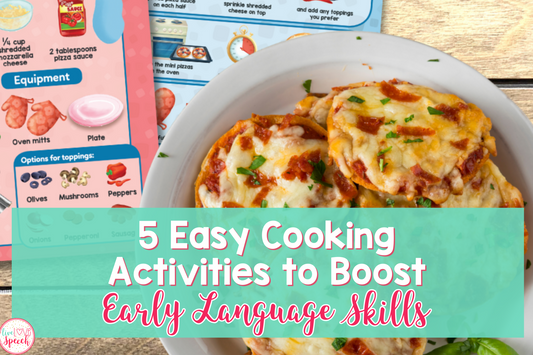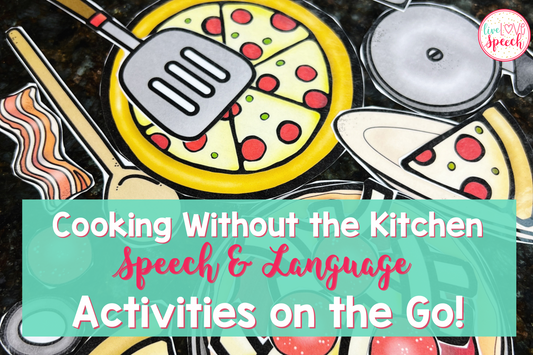Preparation isn't about creating a stressful to-do list; it's about ensuring a smooth and enjoyable experience. Think of the recipe as your guide, and each ingredient as a crucial element. Your job is to have them all lined up and ready to contribute their part to the cooking experience. Pre-measuring ingredients helps to ensure everyone is in sync, ready for their moment on the cooking stage.
Organization is key. Arrange the ingredients in a way that's easily accessible for your kiddos. It's about creating a functional setup, guiding them through the cooking process with ease.
So, as you step into the kitchen, remember that preparation isn't just about efficiency; it's about creating an environment where every child can shine. When the ingredients are ready and waiting, your life is that much easier!
4.Incorporate Language
 Integrate language-building opportunities into the activity. Encourage children to discuss the recipe, use descriptive words for ingredients, and explain the steps they are following.
Integrate language-building opportunities into the activity. Encourage children to discuss the recipe, use descriptive words for ingredients, and explain the steps they are following.
For instance, when mixing ingredients, encourage them to use sequential language such as "first," "next," and "finally." Encourage them to describe the transformation of ingredients during cooking, using terms like "melting," "bubbling," or "rising." This not only reinforces their understanding of procedural language but also helps them become more effective communicators.
Incorporating language-building opportunities in these ways turns the cooking activity into a rich linguistic experience, fostering both cooking skills and expressive language development in an engaging and interconnected manner.
5. Follow a Structured Sequence
Teach children the importance of following a sequence by going through the recipe step by step. This reinforces skills related to sequencing, memory, and attention to detail.
For instance, when baking chocolate chip cookies, stress the significance of creaming butter and sugar before adding eggs to ensure a soft, chewy texture. This not only introduces the concept of sequencing but also enhances memory retention as they internalize the chronological order of tasks. Encourage their attention to detail by discussing how skipping a step might alter the final outcome.
6. Promote Math Skills
 Use cooking to reinforce math concepts. Let's say fractions, discuss how fractions play a crucial role in recipes, explaining that half a cup of flour and a quarter cup of sugar contribute to the perfect batter consistency. This hands-on application not only makes math tangible but also demonstrates its practical importance, fostering a deeper understanding of mathematical concepts.
Use cooking to reinforce math concepts. Let's say fractions, discuss how fractions play a crucial role in recipes, explaining that half a cup of flour and a quarter cup of sugar contribute to the perfect batter consistency. This hands-on application not only makes math tangible but also demonstrates its practical importance, fostering a deeper understanding of mathematical concepts.
Extend the learning adventure by involving children in the art of counting. Whether it's measuring out tablespoons of vanilla extract or keeping track of the number of chocolate chips added to cookie dough, each step becomes a playful math exercise. This interactive approach not only strengthens their counting skills but also instills confidence in applying mathematical principles in everyday scenarios. As they measure, count, and calculate while creating something delicious, children not only acquire essential math skills but also develop a positive attitude towards the subject, realizing that math is not just a classroom exercise but a valuable tool in the kitchen and beyond.
7.Encourage Exploration
Encourage an engaging cooking experience for children by providing them with the freedom to explore and engage their senses in the kitchen. Allow them to touch, smell, taste, and discuss the ingredients, transforming the cooking process into a multisensory adventure. For instance, when preparing a fruit salad, invite your kiddos to feel the textures of the various fruits, from the smoothness of a ripe banana to the juiciness of a watermelon slice. Encourage them to describe the scents coming from herbs and spices, such as the aromatic freshness of basil or the warm, comforting aroma of cinnamon. By fostering an environment where they can taste and discuss ingredients, you not only enhance their sensory experiences but also stimulate cognitive development as they make connections between textures, flavors, and descriptive language.
Then encourage your kids to discuss their sensory observations. Prompt them to articulate how the ingredients feel, smell, and taste, using rich descriptive words. This not only refines their language skills but also deepens their understanding of sensory details, laying the groundwork for effective communication. As they engage in this hands-on exploration, children not only cultivate a love for cooking experimentation but also develop crucial cognitive and language skills.
8. Teamwork and Social Skills:
 Cooking provides an excellent opportunity to instill teamwork and social skills in children. Foster an environment where they can work together harmoniously, sharing responsibilities and communicating effectively. Maybe you're preparing a mini pizza, here you can assign different tasks to each child, such as one spreading sauce, another arranging toppings, and a third monitoring the baking process. This not only promotes a sense of shared responsibility but also requires effective communication to ensure each component comes together seamlessly.
Cooking provides an excellent opportunity to instill teamwork and social skills in children. Foster an environment where they can work together harmoniously, sharing responsibilities and communicating effectively. Maybe you're preparing a mini pizza, here you can assign different tasks to each child, such as one spreading sauce, another arranging toppings, and a third monitoring the baking process. This not only promotes a sense of shared responsibility but also requires effective communication to ensure each component comes together seamlessly.
You can also have your kids verbalize their ideas and listen actively to their peers. Prompt them to discuss preferences and make joint decisions on ingredient choices or cooking techniques. Emphasize the importance of clear communication in preventing misunderstandings and ensuring the success of the culinary creation. As they navigate the cooking activity as a team, children not only refine their cooking skills but also cultivate essential social skills such as cooperation, negotiation, and empathy, which are integral for success in various social contexts.
9. Problem-Solving
While cooking with your kids or students, you might need to swap an ingredient, tweak a recipe, or even rescue that over-baked treat. Because, you know, cooking's not just about the yum factor.
As they encounter obstacles, guide them through a process of logical deduction and experimentation. If a batter is too runny, encourage them to troubleshoot by gradually adding more flour until the desired consistency is achieved. This hands-on problem-solving approach not only refines their culinary skills but also instills confidence in tackling challenges head-on. Emphasize that it's okay for things not to go perfectly and that learning from mistakes is an integral part of the process.
10. Reflect and Discuss
 Alright, so after the cooking chaos (the good kind, of course), it's time to kick back and chat about the whole kitchen adventure. Ask the kids stuff like, "What did you learn today?" or "How did it feel making that dish?" Open-ended questions are the secret here. Let them spill the beans on their wins and maybe even the mishaps. It's not just about the food; it's about what they discovered along the way. Did they realize how fractions work with measuring ingredients? Or maybe they cracked the code on rescuing a too-crispy cookie. These post-cooking chats aren't just about debriefing; they're like the grand finale, where everyone gets to share their kitchen wisdom.
Alright, so after the cooking chaos (the good kind, of course), it's time to kick back and chat about the whole kitchen adventure. Ask the kids stuff like, "What did you learn today?" or "How did it feel making that dish?" Open-ended questions are the secret here. Let them spill the beans on their wins and maybe even the mishaps. It's not just about the food; it's about what they discovered along the way. Did they realize how fractions work with measuring ingredients? Or maybe they cracked the code on rescuing a too-crispy cookie. These post-cooking chats aren't just about debriefing; they're like the grand finale, where everyone gets to share their kitchen wisdom.
Visual Recipes!
As you finish up cooking with the little ones or maybe prepping, I have one last tip! Check out this incredible resource of mine! It is exactly what we've been chatting about in the blog. This gem includes visual recipes that cover everything from vocab and grammar to social skills and more. Plus, I have recipes for year-round here! It's basically a one-stop-shop for turning your classroom or speech room into a hands-on adventure.

SAVE THIS POST OR SHARE WITH YOUR BESTIE!
Pin this post for 10 tips for getting the most out of your cooking activities!





 Integrate language-building opportunities into the activity. Encourage children to discuss the recipe, use descriptive words for ingredients, and explain the steps they are following.
Integrate language-building opportunities into the activity. Encourage children to discuss the recipe, use descriptive words for ingredients, and explain the steps they are following. Use cooking to reinforce math concepts. Let's say fractions, discuss how fractions play a crucial role in recipes, explaining that half a cup of flour and a quarter cup of sugar contribute to the perfect batter consistency. This hands-on application not only makes math tangible but also demonstrates its practical importance, fostering a deeper understanding of mathematical concepts.
Use cooking to reinforce math concepts. Let's say fractions, discuss how fractions play a crucial role in recipes, explaining that half a cup of flour and a quarter cup of sugar contribute to the perfect batter consistency. This hands-on application not only makes math tangible but also demonstrates its practical importance, fostering a deeper understanding of mathematical concepts. Cooking provides an excellent opportunity to instill teamwork and social skills in children. Foster an environment where they can work together harmoniously, sharing responsibilities and communicating effectively. Maybe you're preparing a mini pizza, here you can assign different tasks to each child, such as one spreading sauce, another arranging toppings, and a third monitoring the baking process. This not only promotes a sense of shared responsibility but also requires effective communication to ensure each component comes together seamlessly.
Cooking provides an excellent opportunity to instill teamwork and social skills in children. Foster an environment where they can work together harmoniously, sharing responsibilities and communicating effectively. Maybe you're preparing a mini pizza, here you can assign different tasks to each child, such as one spreading sauce, another arranging toppings, and a third monitoring the baking process. This not only promotes a sense of shared responsibility but also requires effective communication to ensure each component comes together seamlessly. Alright, so after the cooking chaos (the good kind, of course), it's time to kick back and chat about the whole kitchen adventure. Ask the kids stuff like, "What did you learn today?" or "How did it feel making that dish?" Open-ended questions are the secret here. Let them spill the beans on their wins and maybe even the mishaps. It's not just about the food; it's about what they discovered along the way. Did they realize how fractions work with measuring ingredients? Or maybe they cracked the code on rescuing a too-crispy cookie. These post-cooking chats aren't just about debriefing; they're like the grand finale, where everyone gets to share their kitchen wisdom.
Alright, so after the cooking chaos (the good kind, of course), it's time to kick back and chat about the whole kitchen adventure. Ask the kids stuff like, "What did you learn today?" or "How did it feel making that dish?" Open-ended questions are the secret here. Let them spill the beans on their wins and maybe even the mishaps. It's not just about the food; it's about what they discovered along the way. Did they realize how fractions work with measuring ingredients? Or maybe they cracked the code on rescuing a too-crispy cookie. These post-cooking chats aren't just about debriefing; they're like the grand finale, where everyone gets to share their kitchen wisdom. 



